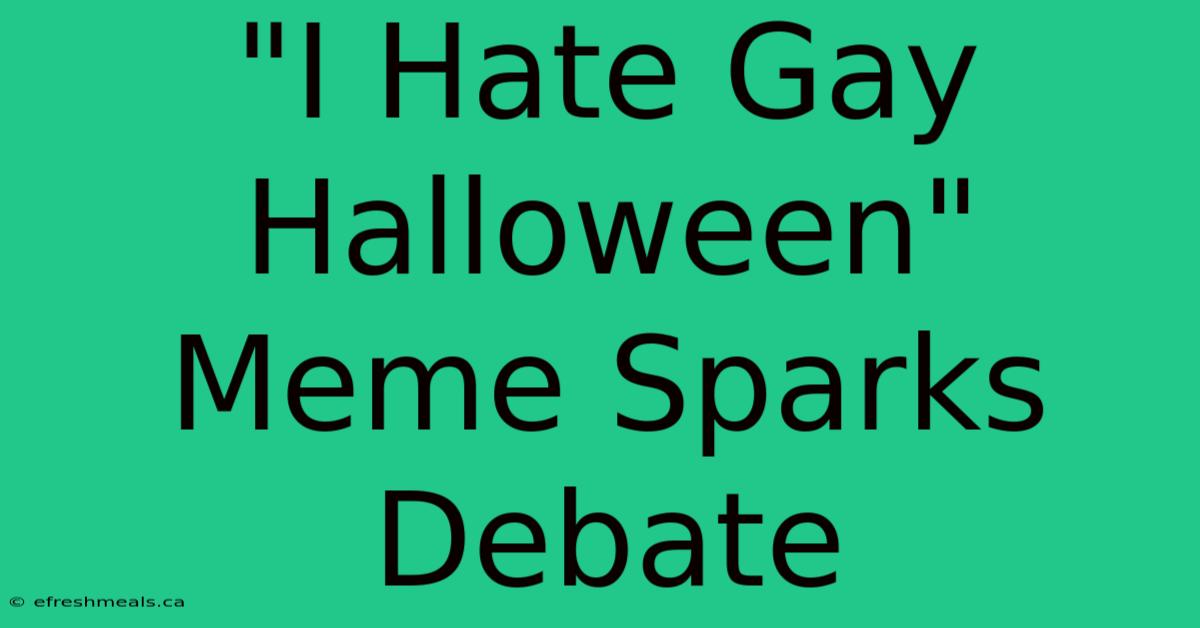"I Hate Gay Halloween" Meme Sparks Debate

Discover more detailed and exciting information on our website. Click the link below to start your adventure: Visit Best Website nimila.me. Don't miss out!
Table of Contents
"I Hate Gay Halloween" Meme Sparks Debate: Exploring the Complexities of Online Humor and LGBTQ+ Representation
Have you seen the "I Hate Gay Halloween" meme circulating online? It's a jarring, satirical image that has ignited fierce discussions about online humor, LGBTQ+ representation, and the boundaries of acceptable satire. This meme, while seemingly lighthearted, reveals deeper complexities about how we navigate sensitive topics in the digital age.
Why It Matters: This meme highlights the tension between humor, social commentary, and the potential for offense. It's not just a funny picture; it's a reflection of evolving cultural attitudes towards LGBTQ+ people and the increasing impact of online memes on shaping those attitudes.
Key Takeaways of the Meme:
| Takeaway | Explanation |
|---|---|
| Satire and Humor | The meme's use of irony and exaggeration to critique societal norms, in this case, homophobic attitudes, is key to understanding its intention. |
| LGBTQ+ Representation | The meme raises questions about the depiction of LGBTQ+ individuals and the potential for it to reinforce stereotypes or contribute to harmful narratives. |
| Online Culture and Memes | This meme demonstrates the power of online spaces to amplify voices, facilitate discussions, and shape cultural perspectives. |
I Hate Gay Halloween: A Closer Look
The meme typically features a cartoon image with a seemingly homophobic statement like "I Hate Gay Halloween" accompanied by a caption that satirizes the absurdity of the sentiment. While intended to be humorous, it raises important questions about the effectiveness of such satire in challenging homophobia.
Exploring the Relationship Between Humor and LGBTQ+ Issues
-
Understanding the Context: The meme's success hinges on its ability to tap into existing cultural anxieties and humor about the "gay agenda," often using exaggeration and absurdity to highlight the irrationality of such anxieties.
-
Intention vs. Impact: While the creators of the meme may intend to critique homophobia, the humor may unintentionally reinforce negative stereotypes, particularly for those unfamiliar with the nuances of online humor.
-
The Role of the Audience: The audience's interpretation and response to the meme play a crucial role in determining its impact. For some, it might resonate as a clever satire; for others, it might perpetuate harmful stereotypes.
The Meme's Impact on Online Discourse
-
Amplified Voices: The meme has sparked online discussions about LGBTQ+ rights, online humor, and the complexities of satire. It has brought these issues to the forefront of public consciousness, encouraging dialogue and debate.
-
Potential for Harm: While the meme may be intended as a critique, it can unintentionally contribute to homophobia by normalizing such sentiments. The humor can also desensitize individuals to the lived experiences of LGBTQ+ people.
-
Cultural Shifts: The meme reflects the ongoing evolution of cultural attitudes towards LGBTQ+ people. The humor's acceptance or rejection reveals the shifting social landscape and how online spaces play a crucial role in shaping these shifts.
FAQ
-
Is the "I Hate Gay Halloween" meme inherently homophobic? While the meme uses a seemingly homophobic statement, its satire relies on the absurdity of the statement to critique homophobia. However, its effectiveness in doing so is debatable.
-
What are some alternatives to this type of humor? More inclusive and nuanced forms of humor that avoid perpetuating stereotypes can be more effective in promoting positive change.
-
Should all humor be judged by its potential for offense? There is a fine line between humor that is satirical and offensive, and context plays a crucial role in determining this line.
Tips for Engaging with Online Humor
-
Be mindful of your audience: Consider the potential impact of your humor on different groups, particularly marginalized communities.
-
Use humor responsibly: Employ humor to critique societal norms, not to reinforce them.
-
Engage in constructive dialogue: Encourage thoughtful discussion about the complexities of online humor and its impact on cultural attitudes.
Summary by "I Hate Gay Halloween" Meme:
The "I Hate Gay Halloween" meme, while seemingly lighthearted, embodies a larger conversation about online humor, LGBTQ+ representation, and the evolving nature of cultural discourse. While its intention may be satirical, its potential to perpetuate harmful stereotypes remains a concern. By critically examining these complex issues, we can navigate the online world with greater awareness and promote a more inclusive and respectful environment.
Closing Message: This meme serves as a reminder that online humor can be a powerful tool for social change. However, it is essential to use humor responsibly, consider its potential impact on others, and engage in respectful dialogue to ensure it serves as a force for good.

Thank you for visiting our website wich cover about "I Hate Gay Halloween" Meme Sparks Debate. We hope the information provided has been useful to you. Feel free to contact us if you have any questions or need further assistance. See you next time and dont miss to bookmark.
Featured Posts
-
Tornado Warning Delaware Ottawa Counties
Nov 01, 2024
-
Georgia Rico Case Young Thug Plea
Nov 01, 2024
-
Central Us Faces Severe Storms Tornadoes Hail Rain
Nov 01, 2024
-
Kelly Clarksons Wild Style Change
Nov 01, 2024
-
Hwy 401 Eastbound Closure In Cambridge
Nov 01, 2024
